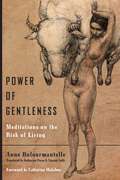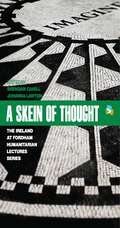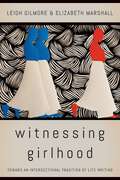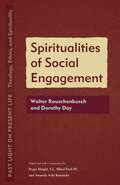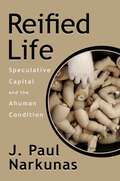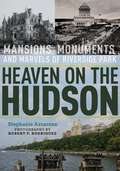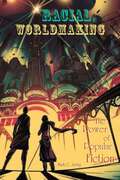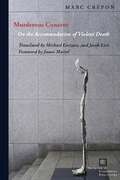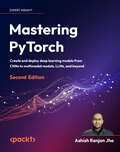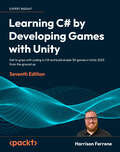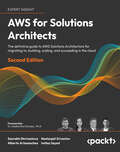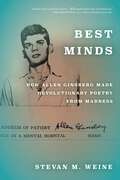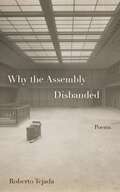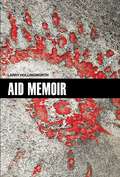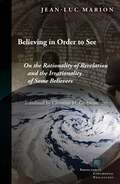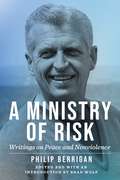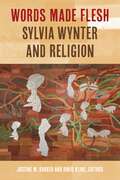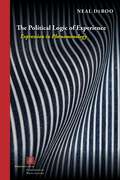- Table View
- List View
Retrieving the Spiritual Teaching of Jesus: Sandra Schneiders, William Spohn, and Lisa Sowle Cahill (Past Light on Present Life: Theology, Ethics, and Spirituality)
by Roger Haight, SJ, Alfred Pach III, and Amanda Avila KaminskiThis volume directs attention to the teaching of Jesus; it introduces the question of how the imagination has to work in order to retrieve the teaching of Jesus and apply it to actual life in our day. Teachers and preachers are engaged in this work all the time, but upon examination it involves a process that bears reflection. We live in a world that is so different from the world in which Jesus taught that many ask about its practicability relative to our complex everyday lives. The volume turns to three authors who work at this, have thought through present-day theory of interpretation, and respond to basic questions that explain the adjustments that allow us to apply Jesus’ teaching to our dilemmas with interpretation that remain faithful to the content that he proposed. Sandra Schneiders turns to modern hermeneutics, the theory of interpretation, and explains what is going on in the human mind that allows us to say that present-day interpretation, while different from Jesus because our “worlds” are different, corresponds to what Jesus communicated in the past relative to his world. William Spohn pushes the same idea further to concrete examples of how analogy, sameness and difference together, both binds the imagination to Jesus and frees us to see new relevance for Jesus’ actual teaching. And Lisa Sowle Cahill takes the spirit of the other two into the social order to show how Jesus’ teaching has a real relevance for the highly complex societies in which we live today. The logics of these three authors offer models for what is going on in all of the Past Light on Present Life volumes as they represent different historical periods and distinct themes in Western Christian spirituality.
Power of Gentleness: Meditations on the Risk of Living
by Anne DufourmantelleGentleness is an enigma. Taken up in a double movement of welcoming and giving, it appears on the threshold of passages signed off by birth and death. Because it has its degrees of intensity, because it is a symbolic force, and because it has a transformative ability over things and beings, it is a power. The simplicity of gentleness is misleading. It is an active passivity that may become an extraordinary force of symbolic resistance and, as such, become central to both ethics and politics. Gentleness is a force of secret life-giving transformation linked to what the ancients called potentiality.In our day, gentleness is sold to us under its related form of diluted mawkishness. By infantilizing it our era denies it. This is how we try to overcome the high demands of its subtlety—no longer by fighting it, but by enfeebling it. Language itself is therefore perverted: what our society intends to give the human beings that it crushes “gently,” it does in the name of the highest values: happiness, truth, security.From listening to those who come to me and confide their despair, I have heard it expressed in every lived experience. I have felt its force of resistance and its intangible magic. In mediating its relation to the world, it appears that its intelligence carries life, saves and amplifies it.
A Skein of Thought: The Ireland at Fordham Humanitarian Lecture Series (International Humanitarian Affairs)
by Brendan Cahill and Johanna LawtonThis book is the result of a strong collaboration between the Permanent Mission of Ireland to the United Nations and Fordham University’s Institute of International Humanitarian Affairs. It is a record of a series of distinguished lectures that explored the current challenges to policymakers and humanitarian actors as they focus their efforts on larger and more complex emergencies. The contributors to this book both identify innovative measures in addressing established problems and address hitherto under-researched emerging issues. A Skein of Thought is the product of this fruitful partnership. Ireland has, through its longstanding peacekeeping, its embrace of multi-lateralism, and its investment in development and humanitarian solutions, been a global leader in confronting and mitigating global disasters. In a similar way, the Institute of International Humanitarian Affairs has been a global leader in humanitarian training, publications, and research. A Skein of Thought: The Ireland at Fordham Humanitarian Lecture Series, then, represents this link between theory and practice.The Refuge PressThe Refuge Press is an independent humanitarian imprint that was founded in 2019. Following on from a successful International Humanitarian Affairs Series through Fordham University Press, The Refuge Press, with Brendan Cahill as its Publisher, publishes four books per year. The Refuge Press books challenge humanitarian thinking and offer personal and professional reflections on global crises.
Witnessing Girlhood: Toward an Intersectional Tradition of Life Writing
by Elizabeth Marshall Leigh GilmoreWhen more than 150 women testified in 2018 to the sexual abuse inflicted on them by Dr. Larry Nassar when they were young, competitive gymnasts, they exposed and transformed the conditions that shielded their violation, including the testimonial disadvantages that cluster at the site of gender, youth, and race. In Witnessing Girlhood, Leigh Gilmore and Elizabeth Marshall argue that they also joined a long tradition of autobiographical writing led by women of color in which adults use the figure and narrative of child witness to expose harm and seek justice. Witnessing Girlhood charts a history of how women use life narrative to transform conditions of suffering, silencing, and injustice into accounts that enjoin ethical response. Drawing on a deep and diverse archive of self-representational forms—slave narratives, testimonio, memoir, comics, and picture books—Gilmore and Marshall attend to how authors return to a narrative of traumatized and silenced girlhood and the figure of the child witness in order to offer public testimony. Emerging within these accounts are key scenes and figures that link a range of texts and forms from the mid–nineteenth century to the contemporary period. Gilmore and Marshall offer a genealogy of the reverberations across timelines, self-representational acts, and jurisdictions of the child witness in life writing. Reconstructing these historical and theoretical trajectories restores an intersectional testimonial history of writing by women of color about sexual and racist violence to the center of life writing and, in so doing, furthers our capacity to engage ethically with representations of vulnerability, childhood, and collective witness.
Spiritualities of Social Engagement: Walter Rauschenbusch and Dorothy Day (Past Light on Present Life: Theology, Ethics, and Spirituality)
by Roger Haight, SJ, Alfred Pach III, and Amanda Avila KaminskiThis volume considers two authors who represent different but complementary responses to social injustice and human degradation. The writings of Walter Rauschenbusch and Dorothy Day respond to an American situation that arose out of the Industrial Revolution and reflect especially—but not exclusively—urban life on the East Coast of the United States during the late nineteenth and first half of the twentieth centuries. Although these two authors differ greatly, they both reacted to the extreme social inequality and strife that occurred between 1890 and the beginning of World War II. They shared a total commitment to the cause of social justice, their Christian faith, and an active engagement in the quest for a just social order. But the different ways they reacted to the situation generated different spiritualities. Rauschenbusch was a pastor, writer, historian, and seminary professor. Day was a journalist who became an organizer. The strategic differences between them, however, grew out of a common sustained reaction against the massive deprivation that surrounded them. There is no spiritual rivalry here. They complement each other and reinforce the Christian humanitarian motivation that drives them. Their work brings the social dimension of Christian spirituality to the surface in a way that had not been emphasized in the same focused way before them. They are part of an awakening to the degree to which the social order lies in the hands of the people who support it. Both Rauschenbusch and Day are examples of an explicit recognition of the social dimension of Christian spirituality and a radical acting-out of that response in two distinctly different ways.
Vertigo: The Temptation of Identity
by Andrea CavallettiReading philosophy through the lens of Alfred Hitchcock’s Vertigo, Andrea Cavalletti shows why, for two centuries, major philosophers have come to think of vertigo as intrinsically part of philosophy itself.Fear of the void, terror of heights: everyone knows what acrophobia is, and many suffer from it. Before Freud, the so-called “sciences of the mind” reserved a place of honor for vertigo in the domain of mental pathologies. The fear of falling—which is also the fear of giving in to the temptation to let oneself fall—has long been understood as a destabilizing yet intoxicating element without which consciousness itself was inconceivable. Some went so far as to induce it in patients through frightening rotational therapies.In a less cruel but no less radical way, vertigo also staked its claim in philosophy. If Montaigne and Pascal could still consider it a perturbation of reason and a trick of the imagination which had to be subdued, subsequent thinkers stopped considering it an occasional imaginative instability to be overcome. It came, rather, to be seen as intrinsic to reason, such that identity manifests itself as tottering, kinetic, opaque and, indeed, vertiginous.Andrea Cavalletti’s stunning book sets this critique of stable consciousness beside one of Hitchcock’s most famous thrillers, a drama of identity and its abysses. Hitchcock’s brilliant combination of a dolly and a zoom to recreate the effect of falling describes that double movement of “pushing away and bringing closer” which is the habitual condition of the subject and of intersubjectivity. To reach myself, I must see myself from the bottom of the abyss, with the eyes of another. Only then does my “here” flee down there and, from there, attract me.From classical medicine and from the role of imagination in our biopolitical world to the very heart of philosophy, from Hollywood to Heidegger’s “being-toward-death,” Cavalletti brings out the vertiginous nature of identity.
Reified Life: Speculative Capital and the Ahuman Condition
by J. Paul NarkunasReified Life addresses the most pressing political question of the 21st century: what forms of life are free and what forms are perceived legally and economically as surplus or expendable, human and otherwise. The 2008 economic crisis solidified the dominion of neoliberal and financial capital to organize human societies much to the detriment of the world’s populations. Reified Life theorizes the dangerous social implications of a posthuman future, whereby human agency is secondary to algorithmic processes, digital protocols, speculative financial instruments, and nonhuman market and technological forces.Employing new readings of Deleuze, Guattari, Foucault, Marx, Vico, Gramsci, Berardi, and Gilbert Simondon, Narkunas contends that it is premature to speak of a posthuman or inhuman future, or employ an ‘ism, given how dynamic and contingent human practices and their material figurations can be. Over several chapters he diagnoses the rise of “market humans,” the instrumentalization of culture to decide the life worth living along utilitarian categories, and the varied ways human rights and humanitarianism actually throw members of the species like refugees outside the human order. To combat this, Reified Life argues against Reified Life calls to abandon the human and humanism, and instead proposes the ahuman to think alongside the human, what philosopher Gilbert Simondon calls the transindividuation of ontogentic processes rather than subjectivity. To aid the “figurating animal,” Reified Life elaborates speculative fictions as critical mechanisms for envisioning alternative futures and freedoms from the domineering forces of speculative capital, whose fictions have become our realities. Narkunas offers, to that end, a novel interpretation of the post-anthropocentric turn in the humanities by linking the diminished centrality of humanism to the waning dominion of nation-states over their populations and the intensification of financial capitalism, which reconfigures politics along economic categories of risk management.
Heaven on the Hudson: Mansions, Monuments, and Marvels of Riverside Park
by Stephanie AzzaroneWinner, Victorian Society in America Book AwardA colorful tale of a singular New York City neighborhood and the personalities who make it specialTo outsiders or East Siders, Riverside Park and Riverside Drive may not have the star status of Fifth Avenue or Central Park West. But at the city’s westernmost edge, there is a quiet and beauty like nowhere else in all of New York. There are miles of mansions and monuments, acres of flora, and a breadth of wildlife ranging from Peregrine falcons to goats. It’s where the Gershwins and Babe Ruth once lived, William Randolph Hearst ensconced his paramour, and Amy Schumer owns a penthouse. Told in the uniquely personal voice of a longtime resident, Heaven on the Hudson is the only New York City book that features the history, architecture, and personalities of this often overlooked neighborhood, from the eighteenth century through the present day.Combining an extensively researched history of the area and its people with an engaging one-on-one guide to its sights, author Stephanie Azzarone sheds new light on the initial development of Riverside Park and Riverside Drive, the challenges encountered—from massive boulders to “maniacs”—and the reasons why Riverside Drive never became the “new Fifth Avenue” that promoters anticipated. From grand “country seats” to squatter settlements to multi-million-dollar residences, the book follows the neighborhood’s roller-coaster highs and lows over time. Readers will discover a trove of architectural and recreational highlights and hidden gems, including the Drive’s only freestanding privately owned villa, a tomb that’s not a tomb, and a sweet memorial to an eighteenth-century child. Azzarone also tells the stories behind Riverside’s notable and forgotten residents, including celebrities, murderers, a nineteenth-century female MD who launched the country’s first anti-noise campaign, and an Irish merchant who caused a scandal by living with an Indian princess.While much has been written about Central Park, little has focused exclusively on Riverside Drive and Riverside Park until now. Heaven on the Hudson is dedicated to sharing this West Side neighborhood’s most special secrets, the ones that, without fail, bring both pleasure and peace in a city of more than 8 million.
Racial Worldmaking: The Power of Popular Fiction
by Mark C. JerngWhen does racial description become racism? Critical race studies has not come up with good answers to this question because it has overemphasized the visuality of race. According to dominant theories of racial formation, we see race on bodies and persons and then link those perceptions to unjust practices of racial inequality. Racial Worldmaking argues that we do not just see race. We are taught when, where, and how to notice race by a set of narrative and interpretive strategies. These strategies are named “racial worldmaking” because they get us to notice race not just at the level of the biological representation of bodies or the social categorization of persons. Rather, they get us to embed race into our expectations for how the world operates. As Mark C. Jerng shows us, these strategies find their most powerful expression in popular genre fiction: science fiction, romance, and fantasy. Taking up the work of H.G. Wells, Margaret Mitchell, Samuel Delany, Philip K. Dick and others, Racial Worldmaking rethinks racial formation in relation to both African American and Asian American studies, as well as how scholars have addressed the relationships between literary representation and racial ideology. In doing so, it engages questions central to our current moment: In what ways do we participate in racist worlds, and how can we imagine and build one that is anti-racist?
Murderous Consent: On the Accommodation of Violent Death (Perspectives in Continental Philosophy)
by Marc CréponWinner, 2002 French Translation Prize for NonfictionMurderous Consent details our implication in violence we do not directly inflict but in which we are structurally complicit: famines, civil wars, political repression in far-away places, and war, as it’s classically understood. Marc Crépon insists on a bond between ethics and politics and attributes violence to our treatment of the two as separate spheres. We repeatedly resist the call to responsibility, as expressed by the appeal—by peoples across the world—for the care and attention that their vulnerability enjoins. But Crépon argues that this resistance is not ineluctable, and the book searches for ways that enable us to mitigate it, through rebellion, kindness, irony, critique, and shame. In the process, he engages with a range of writers, from Camus, Sartre, and Freud, to Stefan Zweig and Karl Kraus, to Kenzaburo Oe, Emmanuel Levinas and Judith Butler. The resulting exchange between philosophy and literature enables Crépon to delineate the contours of a possible/impossible ethicosmopolitics—an ethicosmopolitics to come.Pushing against the limits of liberal rationalism, Crépon calls for a more radical understanding of interpersonal responsibility. Not just a work of philosophy but an engagement with life as it’s lived, Murderous Consent works to redefine our global obligations, articulating anew what humanitarianism demands and what an ethically grounded political resistance might mean.
Mastering PyTorch: Create and deploy deep learning models from CNNs to multimodal models, LLMs, and beyond
by Ashish Ranjan JhaMaster advanced techniques and algorithms for machine learning with PyTorch using real-world examples Updated for PyTorch 2.x, including integration with Hugging Face, mobile deployment, diffusion models, and graph neural networks Purchase of the print or Kindle book includes a free eBook in PDF formatKey FeaturesUnderstand how to use PyTorch to build advanced neural network modelsGet the best from PyTorch by working with Hugging Face, fastai, PyTorch Lightning, PyTorch Geometric, Flask, and DockerUnlock faster training with multiple GPUs and optimize model deployment using efficient inference frameworksBook DescriptionPyTorch is making it easier than ever before for anyone to build deep learning applications. This PyTorch deep learning book will help you uncover expert techniques to get the most out of your data and build complex neural network models. You’ll build convolutional neural networks for image classification and recurrent neural networks and transformers for sentiment analysis. As you advance, you'll apply deep learning across different domains, such as music, text, and image generation, using generative models, including diffusion models. You'll not only build and train your own deep reinforcement learning models in PyTorch but also learn to optimize model training using multiple CPUs, GPUs, and mixed-precision training. You’ll deploy PyTorch models to production, including mobile devices. Finally, you’ll discover the PyTorch ecosystem and its rich set of libraries. These libraries will add another set of tools to your deep learning toolbelt, teaching you how to use fastai to prototype models and PyTorch Lightning to train models. You’ll discover libraries for AutoML and explainable AI (XAI), create recommendation systems, and build language and vision transformers with Hugging Face. By the end of this book, you'll be able to perform complex deep learning tasks using PyTorch to build smart artificial intelligence models.What you will learnImplement text, vision, and music generation models using PyTorchBuild a deep Q-network (DQN) model in PyTorchDeploy PyTorch models on mobile devices (Android and iOS)Become well versed in rapid prototyping using PyTorch with fastaiPerform neural architecture search effectively using AutoMLEasily interpret machine learning models using CaptumDesign ResNets, LSTMs, and graph neural networks (GNNs)Create language and vision transformer models using Hugging FaceWho this book is forThis deep learning with PyTorch book is for data scientists, machine learning engineers, machine learning researchers, and deep learning practitioners looking to implement advanced deep learning models using PyTorch. This book is ideal for those looking to switch from TensorFlow to PyTorch. Working knowledge of deep learning with Python is required.
Learning C# by Developing Games with Unity: Get to grips with coding in C# and build simple 3D games in Unity 2023 from the ground up
by Harrison FerroneLearn C# programming from scratch using Unity as a fun and accessible entry point with this updated edition of the bestselling series. Includes invitation to join the online Unity Game Development community to read the book alongside peers, Unity developers/C# programmers and Harrison Ferrone.Key FeaturesDevelop a strong foundation of programming concepts and the C# languageBecome confident with Unity fundamentals and features in line with Unity 2023Build a playable game prototype in Unity—a working first-person shooter game prototypeBook DescriptionIt's the ability to write custom C# scripts for behaviors and game mechanics that really takes Unity the extra mile. That's where this book can help you as a new programmer! Harrison Ferrone, in this seventh edition of the bestselling series will take you through the building blocks of programming and the C# language from scratch while building a fun and playable game prototype in Unity. This book will teach you the fundamentals of OOPs, basic concepts of C#, and Unity engine with lots of code samples, exercises and tips to go beyond the book with your work. You will write C# scripts for simple game mechanics, perform procedural programming, and add complexity to your games by introducing intelligent enemies and damage-dealing projectiles. You will explore the fundamentals of Unity game development, including game design, lighting basics, player movement, camera controls, collisions, and more with every passing chapter. Note: The screenshots in the book display the Unity editor in full-screen mode for a comprehensive view. Users can easily reference color versions of images by downloading them from the GitHub repository or the graphics bundle linked in the book. What you will learnUnderstanding programming fundamentals by breaking them down into their basic partsComprehensive explanations with sample codes of object-oriented programming and how it applies to C#Follow simple steps and examples to create and implement C# scripts in UnityDivide your code into pluggable building blocks using interfaces, abstract classes, and class extensionsGrasp the basics of a game design document and then move on to blocking out your level geometry, adding lighting and a simple object animationCreate basic game mechanics such as player controllers and shooting projectiles using C#Become familiar with stacks, queues, exceptions, error handling, and other core C# conceptsLearn how to handle text, XML, and JSON data to save and load your game dataWho this book is forIf you're a developer, programmer, hobbyist, or anyone who wants to get started with Unity and C# programming in a fun and engaging manner, this book is for you. You'll still be able to follow along if you don't have programming experience, but knowing the basics will help you get the most out of this book.
Draw and Paint Better with Krita: Discover pro-level techniques and practices to create spectacular digital illustrations with Krita
by Wesley GardnerMaster the art of digital painting with the help of this full-color guide by learning how to implement blending layers, as well as use brushes, color wheels, and techniques using the power of the free tools provided by KritaKey FeaturesUnlock the powerful tools offered by Krita to create customizable UIsDiscover useful tips, tricks, and hacks to build compelling designs and speed up your digital workflowLearn how to use the brush tool and manage colors to create beautiful artworkBook DescriptionKrita is a free, open-source digital painting program with industry-leading functionality and a creative suite of tools able to bring any visual idea to life. It allows for a fast, clean approach to creating digital art, without the hassle of pay-to-play or subscription license fees, but just like all other art software, it takes time and effort to learn it.This book provides a comprehensive look into functional tools, visual problem-solving, and leading painting techniques using Krita to unleash your inner artist. You'll learn the functionality and tools of Krita for creating digital and print-quality work as well as explore manipulation toolsets, custom brush creation, overviews of color spaces, and layer management. As you progress, you'll get to grips with key styles' needed to make professional-grade digital art, through techniques such as photobashing, 3D paint-overs, and more traditional painting methods, along with covering how Krita handles these workflows. Next, you'll work through a few step-by-step art pieces using the skills and tools learned throughout the book.By the end of this Krita book, you'll have a solid understanding of the Krita work environment and be able to bring your artistic visions to life with a myriad of leading industry-standard techniques.What you will learnUse layers, layer management, and layer blending modes to make images popUnderstand Krita's default workspace and customize itUnderstand the terminology of digital visual communication (dots per inch, resolution, and more)Explore color in a digital space, such as RGB profiles and Look-Up-Tables (LUTS)Discover the color wheel for painting and learn how digital color (light and alpha channels) works as opposed to traditional painting materialsFocus on proper layer management for easy, non-destructive manipulation of art pieces quicklyWho this book is forIf you're an artist wanting to take your artwork and portfolio to a professional level, then this book is for you. You'll need some experience using art creation software (ideally Krita, Photoshop, or Clip Studio Paint) before you jump in, but beginners willing to use external sources to keep up will find plenty of useful information. Artists looking to upgrade their skills for work in the entertainment industry will benefit the most from this digital art book.
AWS for Solutions Architects: The definitive guide to AWS Solutions Architecture for migrating to, building, scaling, and succeeding in the cloud
by Alberto Artasanchez Saurabh Shrivastava Neelanjali Srivastav Imtiaz SayedBecome a master Solutions Architect with this comprehensive guide, featuring cloud design patterns and real-world solutions for building scalable, secure, and highly available systems Purchase of the print or Kindle book includes a free eBook in PDF format.Key FeaturesComprehensive guide to automating, networking, migrating, and adopting cloud technologies using AWSExtensive insights into AWS technologies, including AI/ML, IoT, big data, blockchain, and quantum computing to transform your business.Detailed coverage of AWS solutions architecture and the latest AWS certification requirementsBook DescriptionThe second edition of AWS for Solutions Architects provides a practical guide to designing cloud solutions that align with industry best practices. This updated edition covers the AWS Well-Architected Framework, core design principles, and cloud-native patterns to help you build secure, high-performance, and cost-effective architectures. Gain a deep understanding of AWS networking, hybrid cloud connectivity, and edge deployments. Explore big data processing with EMR, Glue, Kinesis, and MSK, enabling you to extract valuable insights from data efficiently. New chapters introduce CloudOps, machine learning, IoT, and blockchain, equipping you with the knowledge to develop modern cloud solutions. Learn how to optimize AWS storage, implement containerization strategies, and design scalable data lakes. Whether working on simple configurations or complex enterprise architectures, this guide provides the expertise needed to solve real-world cloud challenges and build reliable, high-performing AWS solutions.What you will learnOptimize your Cloud Workload using the AWS Well-Architected FrameworkLearn methods to migrate your workload using the AWS Cloud Adoption FrameworkApply cloud automation at various layers of application workload to increase efficiencyBuild a landing zone in AWS and hybrid cloud setups with deep networking techniquesSelect reference architectures for business scenarios, like data lakes, containers, and serverless appsApply emerging technologies in your architecture, including AI/ML, IoT and blockchainWho this book is forThis book is for application and enterprise architects, developers, and operations engineers who want to become well versed with AWS architectural patterns, best practices, and advanced techniques to build scalable, secure, highly available, highly tolerant, and cost-effective solutions in the cloud. Existing AWS users are bound to learn the most, but it will also help those curious about how leveraging AWS can benefit their organization. Prior knowledge of any computing language is not needed, and there’s little to no code. Prior experience in software architecture design will prove helpful.
Jean-Luc Nancy among the Philosophers (Perspectives in Continental Philosophy)
by Irving GohThis volume focuses on the relational aspect of Jean-Luc Nancy’s thinking. As Nancy himself showed, thinking might be a solitary activity but it is never singular in its dimension. Building on or breaking away from other thoughts, especially those by thinkers who had come before, thinking is always plural, relational. This “singular plural” dimension of thought in Nancy’s philosophical writings demands explication.In this book, some of today’s leading scholars in the theoretical humanities shed light on how Nancy’s thought both shares with and departs from Descartes, Hegel, Marx, Heidegger, Weil, Lacan, Merleau-Ponty, and Lyotard, elucidating “the sharing of voices,” in Nancy’s phrase, between Nancy and these thinkers.Contributors: Georges Van Den Abbeele, Emily Apter, Rodolphe Gasché, Werner Hamacher, Eleanor Kaufman, Marie-Eve Morin, Timothy Murray, Jean-Luc Nancy, and John H. Smith
Best Minds: How Allen Ginsberg Made Revolutionary Poetry from Madness
by Stevan M. WeineWINNER, 2024 BEAT STUDIES ASSOCIATION AWARDSA revelatory look at how poet Allen Ginsberg transformed experiences of mental illness and madness into some of the most powerful and widely read poems of the twentieth century.Allen Ginsberg’s 1956 poem “Howl” opens with one of the most resonant phrases in modern poetry: “I saw the best minds of my generation destroyed by madness.” Thirty years later, Ginsberg entrusted a Columbia University medical student with materials not shared with anyone else, including psychiatric records that documented how he and his mother, Naomi Ginsberg, struggled with mental illness.In Best Minds, psychiatrist, researcher, and scholar Stevan M. Weine, M.D., who was that medical student, examines how Allen Ginsberg took his visions and psychiatric hospitalization, his mother’s devastating illness, confinement, and lobotomy, and the social upheavals of the postwar world and imaginatively transformed them.Though madness is often linked with hardship and suffering, Ginsberg’s showed how it could also lead to profound and redemptive aesthetic, spiritual, and social changes. Through his revolutionary poetry and social advocacy, Ginsberg dedicated himself to leading others toward new ways of being human and easing pain. Throughout his celebrated career Ginsberg made us feel as though we knew everything there was to know about him. However, much has been left out about his experiences growing up with a mentally ill mother, his visions, and his psychiatric hospitalization.In Best Minds, with a forty-year career studying and addressing trauma, Weine provides a groundbreaking exploration of the poet and his creative process especially in relation to madness.Best Minds examines the complex relationships between mental illness, psychiatry, trauma, poetry, and prophecy—using the access Ginsberg generously shared to offer new, lively, and indispensable insights into an American icon. Weine also provides new understandings of the paternalism, treatment failures, ethical lapses, and limitations of American psychiatry in the 1940s and 1950s.In light of these new discoveries, the challenges Ginsberg faced appear starker and his achievements, both as a poet and an advocate, even more remarkable.
In Your Eyes I See My Words: Homilies and Speeches from Buenos Aires, Volume 1: 1999–2004
by Pope FrancisAn extraordinary opportunity to understand the vision of Pope FrancisPope Francis is a first in many ways: the first pope from the Americas, the first Jesuit, the first Francis, the first child of immigrants from the Old World, nurtured and transformed by the New World, and returned to lead the whole world. His eloquent homilies and speeches have inspired the faithful of Argentina for decades, largely through his gift of oratory, tracing back to his time as a bishop, archbishop, and cardinal in his home country. Published in English for the first time in their entirety and with contextual annotations, In Your Eyes I See My Words, Volume 1 collects his homilies and speeches from 1999 to 2004. Volume 2 spans from 2005 to 2008, and Volume 3, from 2009 to 2013, concludes with his prophetic last homily before his election to the papacy.This illuminating collection presents an extraordinary opportunity to understand the vision of a great pastor. His words bear witness to the deep experience of faith among God’s people while also showcasing his own extraordinary ability to connect with communities of faith. Through these homilies and speeches, Pope Francis humbly displays his abilities as a wordsmith, a patient and attentive teacher, an inspired and faithful theologian, and a sensitive pastor uniquely attuned to his people, offering ready guidance for their journeys, but also journeying with them.The first of a three-volume translation of Pope Francis’s theological, pastoral, anthropological, and educational thought provides rich insights into the mind and theological unfolding of a spiritual leader who has become beloved all across the globe. Within it we see Archbishop Jorge Mario Bergoglio—later Pope Francis—ministering to the needs of the people while also engaging with the political, technological, and societal forces affecting their daily lives. Here is an ecclesial voice not afraid to challenge the politicians, the culture-makers, and media moguls—even his own ordained and lay church ministers—to live a life of faithfulness marked by justice, equality, and concern for the needs of everyone, urging all to rely on the “vitality of memory” and the “recovery of hope.” In Your Eyes I See My Words also provides a glimpse into the political, social, and religious environment of Argentina and Latin America, providing a unique perspective on the issues confronting the faithful and how those issues motivated and nurtured Pope Francis’s understanding of the Church’s mission to all segments of society—particularly to those underrepresented and on the margins of history.
Why the Assembly Disbanded
by Roberto TejadaPushing the boundaries of Latinx literature and what constitutes a borderlands poetics.Throughout Roberto Tejada’s body of work, the renowned poet and celebrated critic has explored themes of Latinx culture, politics, history, language, and ecologies. In his latest collection, Why the Assembly Disbanded, he presents a unique contribution to Latinx letters that reflects on the relations between the United States and Latin America, especially their real and symbolic borderlands.Immersive, postmodern, and philosophical, Why the Assembly Disbanded provides an associative, critical Latinx aesthetic connecting the Mexico–United States borderlands to Latin America’s neo-baroque heritage. Migrants, settlers, tourists, and exiles moving across various hemispheric landscapes are featured in these exuberant, capacious, and self-reflexive poems. Tejada relates the ravages of white supremacy in our culture that, together with immigrant precarity, turn home into a place of foreboding and impending eviction, even as a dream-weather makes room at last for scenes of possibility and attainment in the account of human history. The sweeping futuristic vistas open on to narratives of colonial extraction, human displacement, abuses of capitalism, mass media spectacle, the antagonism of language and technical images in the sensorium of urban and digital life-worlds, and the relations of desire encouraged by pictures and words in the economy of attention. Los Angeles and Mexico City figure prominently in poems committed to voicing modes of formation and community in an intersectional reckoning of personhoods prompted in work by artists Betye Saar, Amiri Baraka, Connie Samaras, and Rubén Ortiz Torres.With language given to pageantry, tonal precision, and a hopeful lyric radiance that can accommodate ecstasy and justice, Roberto Tejada’s carnivalesque, borderland imagery pushes the boundaries of Latinx literature. World-building by way of reverie, speculation, and retro-futurist tableaux, and with vivid, sometimes violent particularity, his poems enact hallucinatory realities of the hemisphere: an imagination that triangulates history, lyricism, and art as social practice.
Jews and the Ends of Theory
by Shai Ginsburg, Martin Land, and Jonathan BoyarinTheory, as it’s happened across the humanities, has often been coded as “Jewish.” This collection of essays seeks to move past explanations for this understanding that rely on the self-evident (the historical centrality of Jews to the rise of Critical Theory with the Frankfurt School) or stereotypical (psychoanalysis as the “Jewish Science”) in order to show how certain problematics of modern Jewishness enrich theory.In the range of violence and agency that attend the appellation “Jew,” depending on how, where, and by whom it’s uttered, we can see that Jewishness is a rhetorical as much as a sociological fact, and that its rhetorical and sociological aspects, while linked, are not identical. Attention to this disjuncture helps to elucidate the questions of power, subjectivity, identity, figuration, language, and relation that modern theory has grappled with. These questions in turn implicate geopolitical issues such as the relation of a people to a state and the violence done in the name of simplistic identitarian ideologies.Clarifying a situation where “the Jew” is not readily or unproblematically legible, the editors propose what they call “spectral reading,” a way to understand Jewishness as a fluid and rhetorical presence. While not divorced from sociological facts, this spectral reading works in concert with contemporary theory to mediate pessimistic and utopian impulses, experiences, and realities.Contributors: Svetlana Boym, Andrew Bush, Sergey Dolgopolski, Jay Geller, Sarah Hammerschlag, Hannan Hever, Martin Land, Martin Jay, James I. Porter, Yehouda Shenhav, Elliot R. Wolfson
Aid Memoir (International Humanitarian Affairs Ser.)
by Larry HollingworthLarry Hollingworth, current visiting Professor of Humanitarian Studies at Fordham University in New York City, served as head of the UNHCR’s efforts in Bosnia throughout the lengthy conflict that plagued the former Yugoslavia in the early to mid ’90s. Aid Memoir follows Larry and his UN colleagues throughout multiple efforts to provide much-needed relief for besieged, isolated, and desperate communities riddled by senseless killing and aggression. The characters encountered throughout are at times thrilling, at times frightening. Larry spares no details, however troubling, and therefore shines a telling light on the reality of the situation that most will remember to have watched on their television screens.
Believing in Order to See: On the Rationality of Revelation and the Irrationality of Some Believers (Perspectives in Continental Philosophy)
by Jean-Luc MarionFaith and reason, especially in Roman Catholic thought, are less contradictory today than ever. But does the supposed opposition even make sense to begin with? One can lose faith, but surely not because one gains in reason. Some, in fact, lose faith when reason is not able to make sense of the experiences of our lives. We very quickly realize that reason does not understand everything. Immense areas remain incomprehensible and irrational, which we abandon to belief and opinion.Soon we definitively renounce thinking what that has been excluded from the realm of the thinkable. Ideological nightmares arise from this slumber of reason. Thus, the separation between faith and reason, too quickly taken as self-evident and even natural, is born from a lack of rationality, an easy capitulatin of reason before what is supposedly unthinkable. Rather than lose faith through excessive rationality, we often lose rationality because faith is too quickly excluded from the realm that it claims to open, that of revelation. We lose reason by losing faith.Examining such topics as the role of the intellectual in the church, the rationality of faith, the infinite worth and incomprehensibility of the human, the phenomenality of the sacraments, and the phenomenological nature of miracles and of revelation more broadly, this book spans the range of Marion’s thought on Christianity. Throughout he stresses that faith has its own rationality, structured according to the logic of the gift that calls forth a response of love and devotion through kenotic abandon.
A Ministry of Risk: Writings on Peace and Nonviolence
by Philip BerriganExperience the powerful legacy of Philip Berrigan’s nonviolent resistance to war and empireFrom the battlefields of World War II to the front lines of peace activism, Philip Berrigan evolved from soldier to scholar, priest to political prisoner. Confronting the fundamental nature of America’s military-focused culture, Berrigan took an unyielding stance against societal evils—war, systemic racism, unchecked materialism, and the baleful presence of nuclear weapons. Imprisoned by his government and ostracized by his Church, Berrigan’s life is a courageous example of nonviolent resistance and liberation in the face of overwhelming odds.A Ministry of Risk is the definitive collection of Philip Berrigan’s writings. Authorized by the Berrigan family and arranged chronologically, these writings depict the transformation of one revolutionary soul while also providing a firsthand account of a nation grappling with its martial obsessions.Threading the vibrant fabric of history with autobiographical insights, introspective theology, and a clarion call to activism, A Ministry of Risk offers both a living manifesto of nonviolent resistance and a journal of spiritual reflection by one of the 20th century’s most prophetic voices.
Words Made Flesh: Sylvia Wynter and Religion
by Justine M. Bakker and David KlineThe first sustained treatment of religion and religions in the scholarship of a prominent Caribbean thinkerSylvia Wynter is a profoundly transdisciplinary scholar whose works span an impressive array of theory, literature, science, anthropology, philosophy, and religious studies as well as different forms, including essays, plays, a novel, and a 935-page unpublished manuscript entitled “Black Metamorphosis: New Natives in a New World.” Whatever the medium, Wynter frequently engages religion as a relevant category of analysis, from reflections on Christianity, Islam, and Rastafarianism to the category and role of religion as a universal aspect of human social production.Wynter’s writings have received enthusiastic attention by scholars in Black studies, Caribbean theory, critical race theory, literature, and philosophy. But until recently little scholarly writing exists that directly engages the topic of religion in her corpus. Words Made Flesh seeks to fill this gap by focusing exclusively on religion, religions, and religiosity in her work.Bringing together scholars that provide a wide variety of theoretical perspectives on religion, political theology, social theory, and science studies, this book offers an in-depth engagement with one of the most innovative and important thinkers of the last forty years and illustrates how Wynter’s writing has significant implications for the study of religion and religion’s relationship to colonialism, race, humanism, science, and political theology.
Radical Hospitality: From Thought to Action (Perspectives in Continental Philosophy)
by Richard Kearney Melissa FitzpatrickRadical Hospitality addresses a timely and challenging subject for contemporary philosophy: the ethical responsibility of opening borders, psychic and physical, to the stranger. Kearney and Fitzpatrick show how radical hospitality happens by opening oneself in narrative exchange to someone or something other than ourselves—by crossing borders, whether literal or figurative. Against the fears, dogmas, and demands for certainty and security that push us toward hostility, we also desire to wager with the unknown, leap into the unanticipated, and celebrate the new, a desire this book seeks to recognize and cultivate. The book contends that hospitality means chancing one’s hand, one’s arm, one’s very self, thereby opening a vital space for new voices to be heard, shedding old skins, and welcoming new understandings.Radical Hospitality engages with urgent moral conversations concerning identity, nationality, immigration, commemoration, and justice, moving between theory and praxis and on to the formative life of the classroom. Building on key critical debates on the question of hospitality ranging from phenomenology, hermeneutics and deconstruction to neo-Kantian moral critique and Anglo-American virtue ethics, the book explores novel possibilities for an ethics of hospitality in our contemporary world of border anxiety, refugee crises, and ecological catastrophe.
The Political Logic of Experience: Expression in Phenomenology (Perspectives in Continental Philosophy)
by Neal DeRooThe Political Logic of Experience argues that experience and phenomenology are essentially political, with profound implications for our understanding of subjectivity, epistemology, experience, the phenomenological method, and politics. Drawing on work from across the phenomenological tradition, it develops an account of expression as the internal relationship uniting knowing, being, and doing with both transcendental conditions and empirical phenomena. This expressive unification generates subjectivity as an expression of particular communities and subjects as an expression of subjectivity. Subjectivity and experience are therefore both revealed to be inherently political prior to their expression in particular subjects.In clarifying the political nature of experience and the constitution of subjectivity, the book puts the work of critical phenomenology in dialogue with transcendental phenomenology to reveal the need for a phenomenological politics: a field tasked with explaining the expressive, co-constitutive, and necessarily political relationships between subjects and their communities. It is only through such a phenomenological politics that we can properly make sense of the epistemological, ontological, and practical significance of issues like racism and sexism, problems that concern our very experience of the world. The book reveals phenomenology to be both essentially political and politically essential, as it emerges within particular communities and shapes and transforms how individuals within those communities experience the world.Touching on issues of transcendental phenomenology, political strategy, historical interpretation and inter-disciplinary phenomenological method, the book argues for foundational claims pertaining to phenomenology, politics, and social criticism that will be of interest to those working in philosophy, gender studies, race, queer theory, transcendental and applied phenomenology, and beyond.

